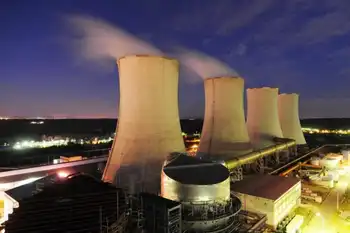Ukraine-ENTSO-E Grid Synchronization links Ukraine and Moldova to the European grid via secure interconnection, matching frequency for stability, resilience, and energy security, enabling cross-border support, islanding recovery, and coordinated load balancing during wartime disruptions.
Key Points
Rapid alignment of Ukraine and Moldova into the European grid to enable secure interconnection and system stability.
✅ Matches 50 Hz frequency across interconnected systems
✅ Enables cross-border support and electricity trading
✅ Improves resilience, stability, and energy security
On February 24 Ukraine’s electric grid operator disconnected the country’s power system from the larger Russian-operated network to which it had always been linked. The long-planned disconnection was meant to be a 72-hour trial proving that Ukraine could operate on its own and to protect electricity supply before winter as contingencies were tested. The test was a requirement for eventually linking with the European grid, which Ukraine had been working toward since 2017. But four hours after the exercise started, Russia invaded.
Ukraine’s connection to Europe—which was not supposed to occur until 2023—became urgent, and engineers aimed to safely achieve it in just a matter of weeks. On March 16 they reached the key milestone of synchronizing the two systems. It was “a year’s work in two weeks,” according to a statement by Kadri Simson, the European Union commissioner for energy. That is unusual in this field. “For [power grid operators] to move this quickly and with such agility is unprecedented,” says Paul Deane, an energy policy researcher at the University College Cork in Ireland. “No power system has ever synchronized this quickly before.”
Ukraine initiated the process of joining Europe’s grid in 2005 and began working toward that goal in earnest in 2017, as did Moldova. It was part of an ongoing effort to align with Europe, as seen in the Baltic states’ disconnection from the Russian grid, and decrease reliance on Russia, which had repeatedly threatened Ukraine’s sovereignty. “Ukraine simply wanted to decouple from Russian dominance in every sense of the word, and the grid is part of that,” says Suriya Jayanti, an Eastern European policy expert and former U.S. diplomat who served as energy chief at the U.S. embassy in Kyiv from 2018 to 2020.
After the late February trial period, Ukrenergo, the Ukrainian grid operator, had intended to temporarily rejoin the system that powers Russia and Belarus. But the Russian invasion made that untenable. “That left Ukraine in isolation mode, which would be incredibly dangerous from a power supply perspective,” Jayanti says. “It means that there’s nowhere for Ukraine to import electricity from. It’s an orphan.” That was a particularly precarious situation given Russian attacks on key energy infrastructure such as the Zaporizhzhia nuclear power plant and ongoing strikes on Ukraine’s power grid that posed continuing risks. (According to Jayanti, Ukraine’s grid was ultimately able to run alone for as long as it did because power demand dropped by about a third as Ukrainians fled the country.)
Three days after the invasion, Ukrenergo sent a letter to the European Network of Transmission System Operators for Electricity (ENTSO-E) requesting authorization to connect to the European grid early. Moldelectrica, the Moldovan operator, made the same request the following day. While European operators wanted to support Ukraine, they had to protect their own grids, amid renewed focus on protecting the U.S. power grid from Russian hacking, so the emergency connection process had to be done carefully. “Utilities and system operators are notoriously risk-averse because the job is to keep the lights on, to keep everyone safe,” says Laura Mehigan, an energy researcher at University College Cork.
An electric grid is a network of power-generating sources and transmission infrastructure that produces electricity and carries it from places such as power plants, wind farms and solar arrays to houses, hospitals and public transit systems. “You can’t just experiment with a power system and hope that it works,” Deane says. Getting power where it is it needed when it is needed is an intricate process, and there is little room for error, as incidents involving Russian hackers targeting U.S. utilities have highlighted for operators worldwide.
Crucial to this mission is grid interconnection. Linked systems can share electricity across vast areas, often using HVDC technology, so that a surplus of energy generated in one location can meet demand in another. “More interconnection means we can move power around more quickly, more efficiently, more cost effectively and take advantage of low-carbon or zero-carbon power sources,” says James Glynn, a senior research scholar at the Center on Global Energy Policy at Columbia University. But connecting these massive networks with many moving parts is no small order.
One of the primary challenges of interconnecting grids is synchronizing them, which is what Ukrenergo, Moldelectrica and ENTSO-E accomplished last week. Synchronization is essential for sharing electricity. The task involves aligning the frequencies of every energy-generation facility in the connecting systems. Frequency is like the heartbeat of the electric grid. Across Europe, energy-generating turbines spin 50 times per second in near-perfect unison, and when disputes disrupt that balance, slow clocks across Europe can result, reminding operators of the stakes. For Ukraine and Moldova to join in, their systems had to be adjusted to match that rhythm. “We can’t stop the power system for an hour and then try to synchronize,” Deane says. “This has to be done while the system is operating.” It is like jumping onto a moving train or a spinning ride at the playground: the train or ride is not stopping, so you had better time the jump perfectly.
Related News












